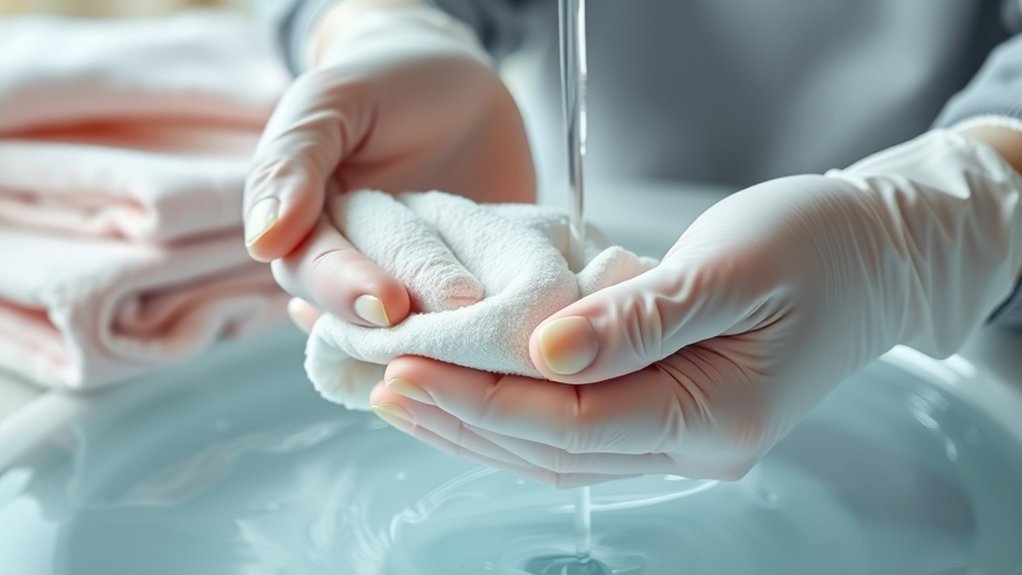Perineal care is vital for your comfort and health, especially during the postpartum period. Maintaining proper hygiene can prevent infections and promote healing. You’ll want to establish an effective washing routine and pay attention to daily care tips to keep irritation at bay. It’s also important to monitor for any signs of infection. Let’s explore how you can achieve peak care and guarantee your recovery is as smooth as possible.
Importance of Perineal Hygiene
When it comes to your health, maintaining perineal hygiene is essential, especially during the postpartum period. This time makes your body more vulnerable to infections like urinary tract infections (UTIs) and vaginal infections.
Proper perineal care not only promotes overall healing after childbirth but also reduces irritation and enhances comfort in sensitive areas. Washing the perineal area at least twice daily with warm water and mild soap is vital; it notably decreases the risk of bacterial growth and infection.
Regularly changing maternity pads every four hours helps prevent moisture buildup and promote hygiene. Additionally, always remember to practice wiping from front to back after urination.
Neglecting these practices can lead to complications, so prioritize your perineal hygiene for your well-being. Engaging in comprehensive postpartum care can significantly support your recovery and health, particularly during this vulnerable time of routine prenatal care.
Effective Washing Routine
To guarantee ideal healing and comfort, establishing an effective washing routine for your perineal area is essential during the postpartum period. Aim to wash or shower at least twice daily, using warm water to soothe discomfort in this sensitive area.
Avoid harsh soaps or fragrances, opting instead for mild, fragrance-free options that won’t irritate. When cleansing, gently wipe from front to back to minimize the risk of bacteria spreading, especially if you have stitches or soreness.
A peri bottle filled with warm water can make cleaning easier and more comfortable, particularly after urination or bowel movements.
Keep an eye out for any signs of infection, such as increased pain or unusual discharge, and consult your healthcare provider if you notice anything concerning.
Daily Care Tips for Comfort
Though the postpartum period can come with discomfort, daily care tips can greatly enhance your comfort and promote healing.
Wash or shower at least twice daily to keep your perineal area clean and lower infection risks. Change your maternity pads every four hours to prevent bacteria buildup.
After using the bathroom, use a peri bottle filled with warm water to gently cleanse your private areas, especially if you have soreness or stitches. Once postpartum bleeding decreases, allow your perineum to air out to reduce moisture buildup.
Staying well-hydrated is vital, as it helps dilute urine and lessens discomfort during urination.
Staying hydrated is crucial for easing discomfort during urination and promoting overall recovery.
Always consult your healthcare professional if you notice conditions if not recognized or have concerns while checking for signs of healing.
Monitoring for Signs of Infection

Monitoring for signs of infection is crucial during your postpartum recovery, as early detection can greatly influence your healing process.
Keep an eye on your perineal area and look for:
- Redness – Notice any areas that appear unusually red.
- Swelling – Watch for increased swelling that doesn’t subside.
- Lesions – Check for any lesions, rashes, or sores that develop.
- Unusual Odors – Be aware of any strange odors or changes in postpartum bleeding.
If you experience increased pain, fever, or any discomfort, report these symptoms immediately.
Regular check-ins with your healthcare provider can help catch potential issues early.
Keeping a log of your symptoms can also assist in monitoring your recovery effectively.
Utilizing Protective Products
Taking care of your perineal area with the right protective products can make a significant difference in your postpartum recovery.
Start by using hypoallergenic barrier creams or moisturizers to maintain skin integrity and prevent irritation. Incorporate prepackaged meatal and perineal cleansing cloths during peri-care to guarantee consistency and reduce contamination risk.
Opt for maternity pads designed specifically for postpartum use; these should be absorbent, and remember to change them regularly to minimize infection risk. A peri bottle filled with warm water can provide gentle cleansing after urination, soothing the perineal area.
Finally, wear breathable clothing made from natural fibers to enhance air circulation and prevent moisture buildup, further protecting your perineal health. Additionally, consider seeking support through local breastfeeding drop-in centers to help with any postpartum challenges you may face.
Frequently Asked Questions
What Does Good Perineal Care Prevent?
Good perineal care prevents urinary tract infections, minimizes the risk of abscesses, and reduces the chances of vaginal infections. It also supports pelvic floor health, alleviates discomfort, and aids in proper healing during recovery.
How to Prevent Perineum?
To prevent perineum issues, cleanse gently with warm water and mild soap daily, change pads regularly, maintain hand hygiene, and let the area air-dry. Wear breathable clothing to reduce moisture and irritation.
What Infection Prevention Measures Should You Take When Providing Perineal Care?
When providing perineal care, you should always wash your hands, use clean wipes, and clean from front to back. Regularly check for signs of infection, and don’t hesitate to report any concerns to your healthcare provider.
What Can I Put on My Perineum to Prevent Tearing?
You can use vitamin E oil, almond oil, or olive oil on your perineum to enhance elasticity and reduce tearing risk. Regular massage with these oils can greatly aid in preparing your body for childbirth.
Conclusion
To summarize, maintaining proper perineal care is essential for your comfort and health, especially postpartum. Did you know that nearly 30% of new mothers experience complications related to perineal hygiene? By washing regularly, changing maternity pads, and monitoring for signs of infection, you can greatly reduce your risk. Remember to utilize protective products like barrier creams to keep irritation at bay. Prioritizing this care not only promotes healing but also enhances your overall well-being during this important time.
